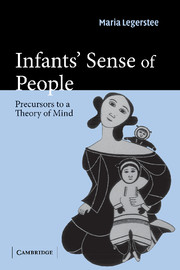Book contents
- Frontmatter
- Contents
- Preface
- 1 Definitions, theories, and plan of the book
- 2 Endogenous and exogenous influences in development
- 3 Animate/inanimate distinction
- 4 Self and consciousness
- 5 Dyadic interactions
- 6 Triadic interactions – Joint engagement in 5 and 7-month-olds
- 7 Social influences on infants' developing sense of people
- 8 Affect attunement and pre-linguistic communication
- 9 The quality of social interaction affects infants' primitive desire reasoning
- 10 Social cognition – affect attunement, imitation, and contingency
- References
- Index
9 - The quality of social interaction affects infants' primitive desire reasoning
Published online by Cambridge University Press: 22 September 2009
- Frontmatter
- Contents
- Preface
- 1 Definitions, theories, and plan of the book
- 2 Endogenous and exogenous influences in development
- 3 Animate/inanimate distinction
- 4 Self and consciousness
- 5 Dyadic interactions
- 6 Triadic interactions – Joint engagement in 5 and 7-month-olds
- 7 Social influences on infants' developing sense of people
- 8 Affect attunement and pre-linguistic communication
- 9 The quality of social interaction affects infants' primitive desire reasoning
- 10 Social cognition – affect attunement, imitation, and contingency
- References
- Index
Summary
The importance of optimal interpersonal relationships
As indicated in chapter 8, the quality of caretaker–infant relationships is not only important for infants' social and emotional growth, but also for cognitive development which has traditionally been regarded as a separate domain (Bruner, 1990; Stern, 1985; Vygotsky, 1978; Trevarthen, 1979). Recent well-controlled studies are beginning to show that infants who consistently take part in optimal interpersonal interactions are better able to learn about the rich social and cognitive world in which they live, than infants who do not. As Jaffe et al. (2001) showed, the quality of mother–infant rhythmic coupling and bidirectional coordination at 4 months predicted attachment and performance on the Bayley at 12 months. The authors argued that coordination in communicative interactions between partners permits “prediction and anticipation of the pattern of accented elements, facilitating efficient information processing, memory, and the representation of interpersonal events” (p. 1). The authors defined the bidirectional approach they employed to imply that the partners are adjusting their behavior to each other.
The finding that mother–infant coordination in preverbal interactions promotes early social–cognitive understanding is both theoretically interesting and important, because it sheds light on the mechanisms that influence social cognitive development. Although quite a lot is known about when various aspects of social cognitive development emerge, there is less empirical evidence about the factors that contribute to its emergence. As indicated, several authors have proposed that infants come to know other minds through interacting with people (Fogel, 1993; Trevarthen, 1991; Tronick, 1989).
- Type
- Chapter
- Information
- Infants' Sense of PeoplePrecursors to a Theory of Mind, pp. 158 - 182Publisher: Cambridge University PressPrint publication year: 2005



